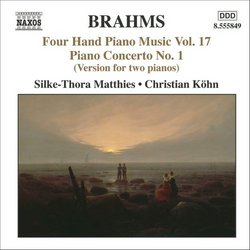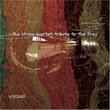| All Artists: Johannes Brahms, Joseph Joachim, Christian Kohn, Silke-Thora Matthies Title: Brahms: Four Hand Piano Music, Vol. 17 Members Wishing: 0 Total Copies: 0 Label: Naxos Original Release Date: 1/1/2006 Re-Release Date: 12/12/2006 Genre: Classical Styles: Chamber Music, Forms & Genres, Concertos, Historical Periods, Classical (c.1770-1830), Instruments, Keyboard Number of Discs: 1 SwapaCD Credits: 1 UPC: 747313584925 |
Search - Johannes Brahms, Joseph Joachim, Christian Kohn :: Brahms: Four Hand Piano Music, Vol. 17
 | Johannes Brahms, Joseph Joachim, Christian Kohn Brahms: Four Hand Piano Music, Vol. 17 Genre: Classical
|
Larger Image |
CD DetailsSimilar CDs |
CD ReviewsOverwhelming Grandeur Hexameron | 03/21/2007 (5 out of 5 stars) "Like Scott Morrison (the reviewer below me), I wish this series would continue for years to come. I really cannot express the profound impact that this Naxos Four Hand series has had on me - I virtually discovered Brahms's music through it! Thus I'm still hoping for future releases; maybe we could get the Piano Concerto No. 2, the Double Concerto, or even the Violin Concerto. This particular recording will be a magnificent finish, though, if the series is indeed concluded. Brahms's massive and gorgeous D minor Piano Concerto is in the top five of my favorite Brahms works. I had my first taste of this large-scale work through the one piano version on Vol. 9 of this series. Naturally, like hearing any other Brahms masterpiece for the first time, I was completely enthralled and gratified. The quality of music aside, the virile and sonorous atmosphere on the piano had a lasting impression on me. I was reminded once again why piano transcriptions and arrangements should not be condemned as hackwork. And now with this present recording of the two piano version of the Op. 15, I'm convinced this work attains the highest degree of power through the medium of two pianos. Since first hearing the concerto through Vol. 9, I've explored the normal piano and orchestra version from Gilels. But Matthies and Kohn have created such a tremendous pianistic success that I don't think I'll be reaching for Gilels again. The ominous opening, with its mighty octave-doublings and deep resonating bass, is more resounding and effective than the orchestral blur that pervades the normal version. The ubiquitous trills that Brahms injects as part of the texture are also more clear and enriched through the delicious tones of the piano. I simply cannot find a tedious or lackluster moment in the first movement, which spans an epic 24 minutes in length. And I don't see how anyone could be unmoved or dissatisfied with the overwhelming grandeur that the dual pianos create. In the second movement, also wonderfully effective on two pianos, Brahms's music becomes noble pathos. The threnodial mood and sublime silences seem all the more expressive through the reverberations of the pianos' strings. Matthies and Kohn's impassioned delivery certainly add credence to the arrangement's worth as well. Even more imposing is the magisterial last movement, where Matthies and Kohn let loose some volcanic splashes and energetic splurges. Their interpretation is not much different from the one piano version on Vol. 9, although their tempo here is faster. Those familiar with the one piano version on Vol. 9 should find enjoyment in noticing the harmonic differences and the individual elaborations of each piano part. I wasn't sure what to expect from Joachim's Demetrius Overture, having remembered my disappointment with his Hamlet Overture on the previous volume. Fortunately, Joachim manages rather well here, producing more agreeable and focused ideas than in the Hamlet Overture. While the fluctuating and impetuous nature of the music makes it difficult to follow, Joachim's ideas are emotional and dramatic. Indeed, it's the intensity and intrepid modulations that make the work more engaging than any melody it contains. In short, it is a better example of Joachim's compositional skills than his Hamlet Overture. And even though I've never even heard its orchestral version, I'm confident both Brahms's arrangement and the piano duo help bring out the best in this music. Bottom line: The two piano version of the Piano Concerto No. 1 is a phenomenon in demonstrating the versatility and unique powers of the piano. Matthies and Kohn remain unconquerable and fully inspired to give us great renditions of Brahms's music through the piano. Let us hope this is not the end, but if it must be, it's a grand conclusion to this magnum opus Four Hand Piano series." Another Winner from Matthies-Köhn J Scott Morrison | Middlebury VT, USA | 12/14/2006 (5 out of 5 stars) "It will come as no surprise to any who have read my earlier reviews of CDs in this series -- now numbering seventeen releases -- of the four-hand piano works of Johannes Brahms that I think this one, too, is a real winner. What might come as a surprise is that this issue is not for piano duet (four hands at one piano) but for two pianos. There has been one earlier two piano release in the series and frankly my guess is that this might very well be the last in the Brahms series -- although I've thought that before and then been surprised when yet another arrives -- but I can't be sure about that because the fine German piano duo of Silke-Thora Matthies and Christian Köhn keeps finding out-of-print or unpublished piano manuscripts by Brahms.
Brahms's two-piano arrangement of his First Piano Concerto in D Minor, Op. 15, was published by a Swiss firm, Rieter-Biedermann, in 1873. I did not know of its existence, although of course I've seen (and played from) the Emil von Sauer arrangement for solo piano and second-piano accompaniment published by Schirmer. One wonders why this version, verifiably by Brahms, is not the standard piano score, e.g., score for solo piano with second piano playing the accompaniment. It seems to be arranged precisely that way -- that is, the piano solo is played by one of the Matthies-Köhn team (although we're not told which of them) while the other plays the orchestral part. This is in distinction to the four-hands-at-one-piano version that appears on Vol. 9 of the series in which the solo and orchestral parts are distributed among the four hands. Be all that as it may, this is a sparkling version of the concerto that deserves to stand on its own. Even when compared with the piano/orchestra version there are some felicities, not the least of which are the very effective thundering opening bars with their multi-octave trills which can often sound strained and shrill in the orchestral original. An interesting side-note: The concerto was originally conceived as a two-piano sonata. As far as I know it was never published in that form, but one does then wonder to what extent this version that Brahms made some fifteen years after the premiere of the piano/orchestra version overlaps the two-piano sonata original. The CD is concluded with a performance of Brahms's two-piano arrangement of his friend Joseph Joachim's concert overture 'Demetrius.' It is played by the Matthies-Köhn duo from Brahms's manuscript found in a Hamburg library. It is a concert overture to a play 'Demetrius' by Hermann Grimm (son of one of the Brothers Grimm) which tells the story best known to us as that of the 'false Dmitri' as related in the plot of Mussorgsky's 'Boris Godunov.' The overture is rhapsodic (at times it reminds me of Schumann's Fantasy in C) and dramatic, with lyrical interludes and a good deal of expert contrapuntal manipulation of its insistent main theme. That theme became an 'earworm' for me and I went for several days with it singing in my auditory memory. I'm not sure for whom this CD will be attractive: Brahmsians, for sure, and perhaps for those who are drawn to the music of Joachim (who wrote tons of music almost never played these days). Fans of Matthies and Köhn, and surely there are many of them now, will snap it up. But I do believe that even a casual music-lover would be amply rewarded by listening to his disc. Scott Morrison" |

 Track Listings (4) - Disc #1
Track Listings (4) - Disc #1

